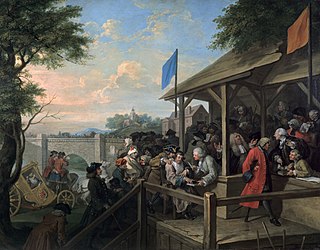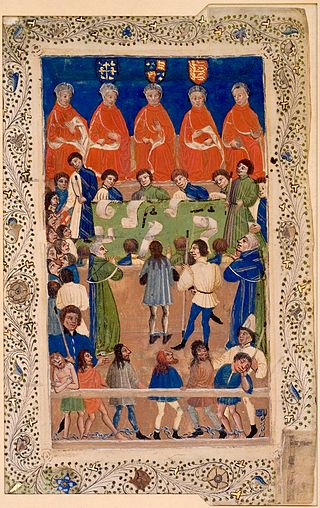External links
- English translation of the book courtesy of Internet Archive
La Novelle Natura Brevium (1534) was a treatise on English law by Anthony Fitzherbert. It is often cited in judgments today across the common law world, and represents an important tract on the rules of common law in the 16th century.
In jurisprudence, double jeopardy is a procedural defence that prevents an accused person from being tried again on the same charges following an acquittal or conviction and in rare cases prosecutorial and/or judge misconduct in the same jurisdiction. Double jeopardy is a common concept in criminal law. In civil law, a similar concept is that of res judicata. Variation in common law countries is the peremptory plea, which may take the specific forms of autrefois acquit or autrefois convict. These doctrines appear to have originated in ancient Roman law, in the broader principle non bis in idem.
Trespass is an area of tort law broadly divided into three groups: trespass to the person, trespass to chattels, and trespass to land.
The defence of property is a common method of justification used by defendants who argue that they should not be held liable for any loss and injury that they have caused because they were acting to protect their property.
In criminal law, property is obtained by false pretenses when the acquisition results from the intentional misrepresentation of a past or existing fact.

The Theft Act 1968 is an Act of the Parliament of the United Kingdom. It creates a number of offences against property in England and Wales. On 15 January 2007 the Fraud Act 2006 came into force, redefining most of the offences of deception.
The forms of action were the different procedures by which a legal claim could be made during much of the history of the English common law. Depending on the court, a plaintiff would purchase a writ in Chancery which would set in motion a series of events eventually leading to a trial in one of the medieval common law courts. Each writ entailed a different set of procedures and remedies which together amounted to the "form of action".
In tort law, detinue is an action to recover for the wrongful taking of personal property. It is initiated by an individual who claims to have a greater right to their immediate possession than the current possessor. For an action in detinue to succeed, a claimant must first prove that he had better right to possession of the chattel than the defendant, and second, that the defendant refused to return the chattel once demanded by the claimant.
Assumpsit, or more fully, action in assumpsit, was a form of action at common law used to enforce what are now called obligations arising in tort and contract; and in some common law jurisdictions, unjust enrichment. The origins of the action can be traced to the 14th century, when litigants seeking justice in the royal courts turned from the writs of covenant and debt to the trespass on the case.
A castle doctrine, also known as a castle law or a defense of habitation law, is a legal doctrine that designates a person's abode or any legally occupied place as a place in which that person has protections and immunities permitting one, in certain circumstances, to use force to defend oneself against an intruder, free from legal prosecution for the consequences of the force used. The term is most commonly used in the United States, though many other countries invoke comparable principles in their laws.
Trover is a form of lawsuit in common law jurisdictions for recovery of damages for wrongful taking of personal property. Trover belongs to a series of remedies for such wrongful taking, its distinctive feature being recovery only for the value of whatever was taken, not for the recovery of the property itself.
Ejectment is a common law term for civil action to recover the possession of or title to land. It replaced the old real actions and the various possessory assizes where boundary disputes often featured. Though still used in some places, the term is now obsolete in many common law jurisdictions, in which possession and title are sued by the actions of eviction and quiet title, respectively.
The Case of the Thorns (1466) YB 6 Ed 4, 7a pl 18 is an important historical court case from the King's Bench in common law torts. The English case, which occurred in the 15th century, is the earliest record of a common law court basing its decision on the now fundamental principle of torts: That if an individual suffers (civil) damages at the hand of another, that individual has a right to be compensated.

Ashby v White (1703) 92 ER 126, is a foundational case in UK constitutional law and English tort law. It concerns the right to vote and misfeasance of a public officer. Lord Holt laid down the important principle that where there is injury in the absence of financial loss (injuria sine damno) the law makes the presumption of damage and that it is sufficient to demonstrate that a right has been infringed.

The Bill of Middlesex was a legal fiction used by the Court of King's Bench to gain jurisdiction over cases traditionally in the remit of the Court of Common Pleas. Hinging on the King's Bench's remaining criminal jurisdiction over the county of Middlesex, the Bill allowed it to take cases traditionally in the remit of other common law courts by claiming that the defendant had committed trespass in Middlesex. Once the defendant was in custody, the trespass complaint would be quietly dropped and other complaints would be substituted.
Scott v. Shepherd 96 Eng. Rep. 525, commonly known as the "flying squib case," is an important English tort law case on remoteness and the principle of novus actus interveniens as it related to the division between trespass and case.

Royscot Trust Ltd v Rogerson[1991] EWCA Civ 12 is an English contract law case on misrepresentation. It examines the Misrepresentation Act 1967 and addresses the extent of damages available under s 2(1) for negligent misrepresentation.

Slade's Case was a case in English contract law that ran from 1596 to 1602. Under the medieval common law, claims seeking the repayment of a debt or other matters could only be pursued through a writ of debt in the Court of Common Pleas, a problematic and archaic process. By 1558 the lawyers had succeeded in creating another method, enforced by the Court of King's Bench, through the action of assumpsit, which was technically for deceit. The legal fiction used was that by failing to pay after promising to do so, a defendant had committed deceit, and was liable to the plaintiff. The conservative Common Pleas, through the appellate court the Court of Exchequer Chamber, began to overrule decisions made by the King's Bench on assumpsit, causing friction between the courts.
Trespass in English law is an area of tort law broadly divided into three groups: trespass to the person, trespass to goods, and trespass to land.
Fellows v. Blacksmith, 60 U.S. 366 (1857), is a United States Supreme Court decision involving Native American law. John Blacksmith, a Tonawanda Seneca, sued agents of the Ogden Land Company for common law claims of trespass, assault, and battery after he was forcibly evicted from his sawmill by the Company's agents. The Court affirmed a judgement in Blacksmith's favor, notwithstanding the fact that the Seneca had executed an Indian removal treaty and the Company held the exclusive right to purchase to the land by virtue of an interstate compact ratified by Congress.